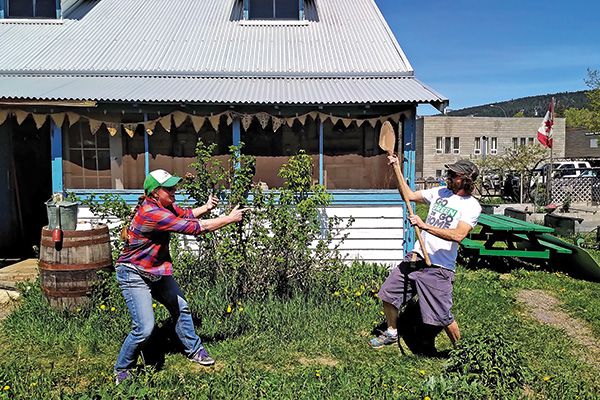By Oliver Berger —
Wow, what a crazy past few months!

At first, I was sad to see our Share Sheds close, along with the best Salvation Army (Williams Lake) in British Columbia—a serious gold mine for reusables. Then, all my class presentations got cancelled as schools closed their doors to students. No more garbage talks with the kids. Ugh, what was happening around me? I could not even take my reusable mug to get a to-go coffee anymore!
Many efforts to curb single-use products and promote sharing with reusing and repurposing came to a grinding halt. What was a waste educator to do?
It does not matter whether there is a fire, a flood, or a pandemic, there is one thing in life we can always rely upon, other than dishes, and that my friends, is garbage.
Just as doctors and nurses keep on helping humans, food continues to be served and gas keeps on getting pumped, and you might not always notice, but garbage keeps on moving. Out the door it goes from your home to the garbage can, to the depot, to the truck, and finally, to the landfill. The leftovers do not really lay to rest here, either—they begin to degrade or ferment and compact, releasing leachates and methane gas. However, we will save that topic for another day.
How am I adapting?
Just like many other educators out there have done, Cariboo Chilcotin Conservation Society waste educator Mary Forbes and I have taken to the World Wide Web to spread our message. We adapted our message from talking in front of large groups of people to video-educating via phone through social media. We just imagine a small phone is you, the public, and roll with it.
With spring clean up on our minds, we initially talked about properly recycling all the built-up packaging and why it is so important to sort your materials accurately. After showing you how easy it is to build your own waste-diversion station at home, we showcased different categories for plastics recycling, from stretchy to crinkly, bubbly, crunchy, rigid, and bendy.
Later, we live-streamed from the main transfer station in Williams Lake, explaining the influx of traffic. The yard and garden waste section saw a large increase in tonnage so far this season due to the extra time people have to play in their gardens and because many folks are hard at work fire-proofing their properties. There was a traffic jam at the dump!
These discussions led us into International Composting Awareness Week, which ran from May 3–9. We wanted to teach how to manage your yard and kitchen waste at home. The Potato House Project in Williams Lake experienced record interest in its ‘Black Gold’ soil amendment and was inundated with inquiries about gardening and composting. We took advantage of the hype and made some videos on how to compost at home, giving away some of our trade secrets and covering every aspect of food waste recovery from Bokashi, to vermi-composting, to using animals, and the different backyard composters you can build yourself.
The feedback so far has been wonderful! Everyone is keen on learning so much more during these interesting times. We have a perfect chance to look inside our homes and ourselves with new eyes. Asking questions such as, “How can I improve this? How can I improve myself?” Maybe you want to learn how to bake or cook healthier. Perhaps you are finally going to fix that bike in your backyard. Or even better, maybe you have now decided to craft some items from your leftovers bin into something wonderful for your new garden.
Our educating has shifted right back to where it has always been. Repairing is reusing, composting is recycling food waste energy into soil, and cooking for yourself is reducing the energy it takes to make the food when you eat out.
Speaking of eating out, we are once again dealing with extra take-out containers. Not being able to bring our own take-out containers is super frustrating; however, I challenge you to say no to the cutlery, at least. You have these at home; bring them with you. Refuse the plastic bag at the grocery store, use the cart you already have, and unload those items into your vehicle, as is. The other day I brought my plastic coffee cup lid back with me and reused it on my next cup. We can and will adapt around these new protocols.
Keep on tagging along as Mary Forbes and I show you more tips. Tune into the Cariboo Chilcotin Conservation Society’s facebook page every Tuesday for our next Trash Talk #trashtalktuesdays, or to see our previous talks, or check us out on Instagram @ccc_society.
Oliver Berger has a 38-year degree in life, enjoying school from birth to the present in the Cariboo area. Constantly venturing around this Earth on a quest to learn new skills, Oliver’s priorities include dedication to and education about the management of society’s leftovers.

